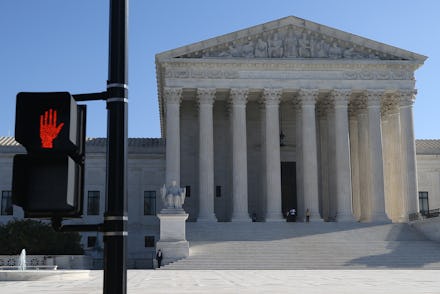The Supreme Court refused to take up a lawsuit over Pennsylvania's mail-in voting

President Trump's failure to win re-election was a resounding blow for many Republicans and, for some, the loss was too much to accept. For over a month, Republicans, and the Trump campaign, have filed a seemingly endless onslaught of election lawsuits. But recently, their bid to overturn the elections was dealt another blow after the Supreme Court refused to take up a lawsuit over Pennsylvania's mail-in voting.
The lawsuit in question was filed on Nov. 21 by Pennsylvania Rep. Mike Kelly (R) and a few others who argued that Pennsylvania's 2019 law allowing no-excuse mail-in voting is unconstitutional. Per NPR, they requested that the state either reject over 2.5 million mail-in votes or let state lawmakers pick the presidential electors, rather than have electors vote according to who won the state, which is President-elect Joe Biden. (Republicans control the state legislature.)
The state's Supreme Court tossed out the lawsuit on Nov. 28, stating that the plaintiffs waited too long to bring forth a complaint. The law they are taking issue with had been passed in October 2019, which is 13 months before Election Day, and it passed with support from Pennsylvania Republicans. And as NBC News outlined, the plaintiffs waited until after the Pennsylvania primary and 28 days after the general election to file their lawsuit which, the state Supreme Court said, showed "a complete failure to act with due diligence."
Turning to the Supreme Court was this lawsuit's last chance. But on Tuesday, the Supreme Court issued a one-sentence order stating, "The application for injunctive relief presented to Justice [Samuel] Alito and by him referred to the Court is denied." There were no public dissents.
The court's order was called a "key victory of our democracy" by Kristen Clarke, president of the Lawyer's Committee for Civil Rights Under Law. Clarke said, per NPR, that "this decision is also a key victory for Black Americans, who were the targets of this effort and many others. Black votes matter, Black voices matter, and Black Americans will not be treated as second-class citizens."
It's not surprising to see that the Supreme Court won't touch this case with a 10-foot pole. While Trump continues to cry voter fraud, his own Cabinet department described the elections as the "most secure" in American history. Even his appointee and past ally Attorney General Bill Barr came out to say there's no evidence of it. Trump himself has failed to produce any real evidence of widespread fraud, and none of his supporters have either.
Pennsylvania has been the focus of numerous lawsuits because Trump's hopes of re-election were pretty much lost when it turned blue on Nov. 7. Shortly before the election, Trump said it's a "terrible thing" that valid mail-in ballots would be counted in battleground states, and his campaign filed a last-ditch appeal in Pennsylvania to challenge election results last month following a federal judge's scathing dismissal of the case.
In his order, U.S. Middle District Judge Matthew Brann cited the campaign's lack of evidence for any supposed voter fraud. He wrote that the campaign "ask[s] this court to disenfranchise almost 7 million voters," but rather than presenting "compelling legal arguments and factual proof," the Trump campaign only offered "strained legal arguments without merit and speculative accusations" that were "unsupported by evidence."
Similar to Brann, lawyers representing Pennsylvania Gov. Tom Wolf's (D) administration did not hold back in their condemnation of Kelly's attempts to disenfranchise millions of voters. They wrote, "After waiting over a year to challenge Act 77, and engaging in procedural gamesmanship along the way, they come to this court with unclean hands and ask it to disenfranchise an entire state. They make that request without any acknowledgment of the staggering upheaval, turmoil, and acrimony it would unleash."